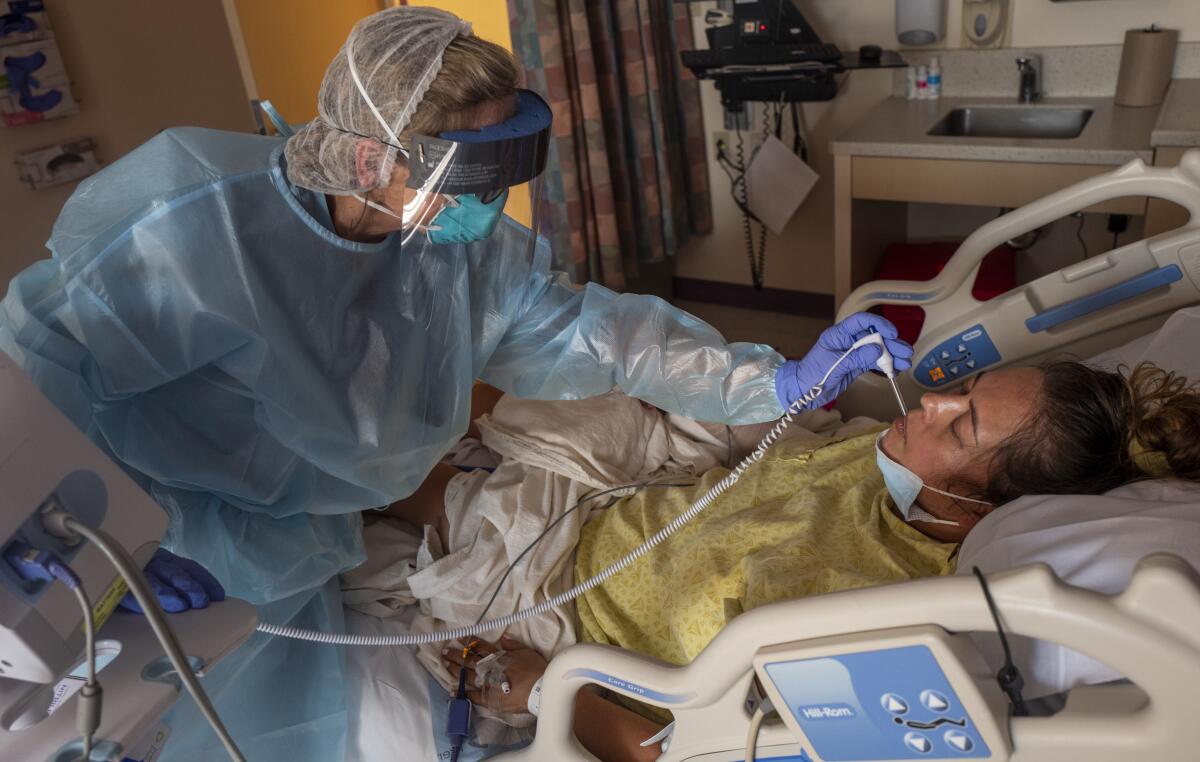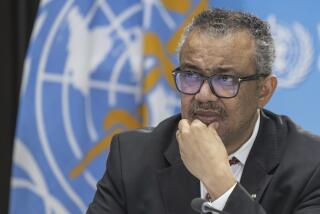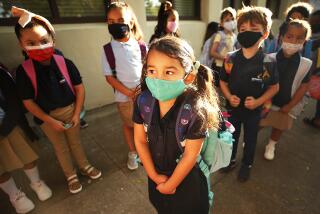WHO says new coronavirus variant poses ‘very high’ risk of global infection surges

- Share via
Countries around the world struggled to come to terms with a bleak new turn in the nearly 2-year-old pandemic, with the World Health Organization warning Monday that Omicron, a highly mutated variant of the coronavirus, poses a “very high” global risk of new outbreaks.
The variant’s emergence “underlines just how perilous and precarious our situation is,” WHO chief Tedros Adhanom Ghebreyesus said Monday.
“We shouldn’t need another wake-up call,” said Tedros. “We should all be wide awake to the threat of this virus.”
In measures reminiscent of the outbreak’s early days, when the virus swiftly circumnavigated the globe, some governments moved to impose travel bans and border closures in a bid to keep the variant at bay.
Japan said Monday it would bar non-citizens from entry, becoming the second country, after Israel, to do so. Morocco went a step further, barring all incoming flights for two weeks, and many nations have restricted travel from South Africa, where the variant was detected last week.
But Omicron has already been detected in more than a dozen countries, including the U.S.’s northern neighbor, Canada, and health authorities said the variant’s contagiousness, and the wide geographic dispersal of existing cases, suggest it is already in wide circulation.
Regions where the mutation has been found range from Europe to the Middle East to East Asia, in countries that include Britain, Germany, France, Portugal, Denmark, Israel, Hong Kong and Australia.
Experts stressed that much remains unknown about this variant, including the severity of illness it causes — no deaths have yet been attributed to it — and how effective existing vaccines are against it.
Finding even preliminary answers to these questions will probably take a week or two, said Dr. Anthony Fauci, the premier COVID-19 advisor to the Biden administration. While no U.S. cases have yet been reported, Fauci told ABC’s “Good Morning America” on Monday that it was “inevitable” that the variant would find a way in.
In Washington, President Biden said Omicron was “cause for concern, not a cause for panic.” He used a speech from the White House to again call on Americans to get vaccinated, and to get a booster shot if they had already gotten the vaccine.
The WHO, the United Nations health agency, also urged its 194 member states to accelerate vaccinations, particularly for vulnerable groups. Group of Seven health ministers were holding an emergency meeting Monday on the new variant.
For a virus-battered world, news of Omicron’s emergence was a harsh blow, heading into year-end holidays and the prospect of a third winter shadowed by disease and disruption.
Worldwide financial markets, which had plunged last week after South Africa’s announcement, steadied somewhat, but in many countries, there was a widespread sense that neither the national economy nor a frazzled citizenry would accept draconian measures such as a total shutdown.
In recent weeks, several European countries were hit by protests over restrictions and mandates amid a fourth wave of COVID-19, with some spiraling into violence. In much of Europe, as in the United States, there is a small but entrenched movement opposed to vaccines, often aligned with the political far right.
The WHO and others have said Omicron is particularly concerning because of its unprecedented number of spike mutations, which could affect the overall trajectory of the pandemic. “The overall global risk related to the new variant of concern, Omicron, is assessed as very high,” the health agency said.
Experts have long warned that poorer countries’ limited access to vaccines — as well as vaccine hesitancy, when shots are readily available — gives the virus greater opportunities to mutate.
Travel curbs are a much-debated remedy. The WHO suggested that countries take a “risk-based” approach, but added that vulnerable populations were at “substantial” risk, particularly in countries with low vaccination rates.
Countries including the United States moved to restrict travel from South Africa and at least seven other African nations. That prompted complaints that South Africa was being punished for being prompt and transparent in reporting its findings on the new variant.
The WHO appeared to agree, with Tedros saying the current system “disincentivizes countries alerting others to threats that will inevitably land on their shores.”
More to Read
Sign up for Essential California
The most important California stories and recommendations in your inbox every morning.
You may occasionally receive promotional content from the Los Angeles Times.










